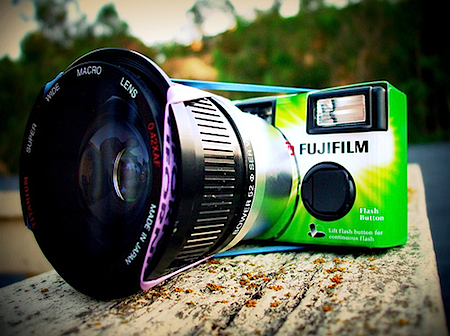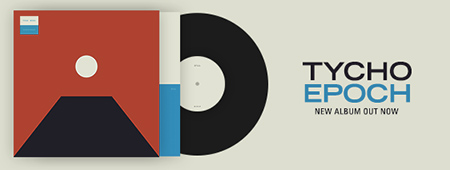Your Camera Doesn’t Matter
 I happened on this article a while back and its message has always stuck with me (although I still obsess over new camera gear). But even a self-confessed gear addict can admit there are some pretty interesting points in there. The article by Ken Rockwell details his theory that you can achieve the results you want with a $150 camera or a $5000 camera, it’s just about understanding and working with the equipment. I don’t agree with everything he has to say, but it’s a good read for anyone lusting after some of the new, and ridiculously expensive, DSLRs popping up. And if you need proof of Rockwell’s claim that “a great photographer can take great pictures with a disposable”, look no further than Flickr where a simple search will yield some really amazing shots, all taken with disposables. A couple of my favorites are here and here. Also worth a read is Rockwell’s “$150 Camera vs. $5000 Camera” article.
I happened on this article a while back and its message has always stuck with me (although I still obsess over new camera gear). But even a self-confessed gear addict can admit there are some pretty interesting points in there. The article by Ken Rockwell details his theory that you can achieve the results you want with a $150 camera or a $5000 camera, it’s just about understanding and working with the equipment. I don’t agree with everything he has to say, but it’s a good read for anyone lusting after some of the new, and ridiculously expensive, DSLRs popping up. And if you need proof of Rockwell’s claim that “a great photographer can take great pictures with a disposable”, look no further than Flickr where a simple search will yield some really amazing shots, all taken with disposables. A couple of my favorites are here and here. Also worth a read is Rockwell’s “$150 Camera vs. $5000 Camera” article.
I guess at the end of the day you’re really just paying for features when you buy a high end camera body. Easy access to settings, quicker focus, faster shots: it all adds up to an easier to use camera that allows you to get the shots when they present themselves. I remember my old Nikon CP 8800 fondly, it took great photos, but it was a total pain to use and I can’t even count the number of great shots I missed waiting for that thing to focus or write to the memory card (it took forever to do both).
Above image Via lslphoto

18 Comments Leave A Comment
Daniel Carvalho says:
October 23, 2008 at 1:43 amInteresting article, haven’t had the time to read all of it, but in many ways he’s touched on something that has always kind of bothered me. People, especially enthusiasts, place huge amounts of emphasis on gear. The “gains” from good to really-good camera equipment never seemed that obvious to me.
You can still shoot unsharp, overexposed junk with your pro camera. I think once you start getting into the decent range of cameras, as you go up the price bracket it’s very much a case of diminishing returns.
I’ve seen they case where I’ve taken shots with a Canon 350D Rebel that looks better than photos taken by some other photographer using his über camera in sharpness and creatively (not saying that I think I’m particularly awesome).
I guess, at the end of the day, I think there’s a line that you meet where technology becomes irrelevant and creativity is king. Not having the best tools, but what you can do with them.
n8w says:
October 23, 2008 at 2:16 amI agree Daniel,
I think the excruciatingly boring image and composition (the trees) used in this example is by far the best way to point out how similar these two price points CAN perform.
However if he had composed an interesting shot with a nice subject and depth of field I think the differences would have been much more prevalent!
Scott says:
October 23, 2008 at 2:20 amDaniel-
I totally agree with you. I think the number one reason I would pay for a higher end camera though is low light shooting situations. Of course you can get great results with any camera in perfect settings, good lighting, stable surface, etc.. But trying to shoot without a flash in darker settings can be trouble even with a DSLR like the D80. I think it’s demanding conditions like low light or high speeds (sports etc..) that really highlight what these top level DSLRs can do.
Scott says:
October 23, 2008 at 2:22 amn8w-
agreed, the shot he’s using to illustrate the point isn’t exactly the best choice.
Llefenni says:
October 23, 2008 at 3:11 amI’m always really annoyed at photo stores trying to make me spend £100s on photo kit – I’ve gone back to 35mm for my shots and mt 10 yr old Canon Mju II shoots better pictures (http://flickr.com/photos/llefenni) than any digital camera i’ve come accross within my budget. Imho, it cost me $10 from ebay, and other than the occasional light leak it does the job.
Clint says:
October 23, 2008 at 3:56 am“the megapixel myth” article is very good as well.
I somewhat think Ken is pushing his point too radically than what is realistic, just to combat what he sees is a lot of people buying cameras just because they are shiny and expensive. i mean really. the $150 and $5k may be equal when taking static shots of trees but try and compare the two in a low light concert setting? i’m sorry the 5k digital camera is going to smoke the manual feed 35mm camera hands down.
Yes film is still great and yes digital doesn’t have the “look” of film but there are just so many usability options on the high end DSLRs that they really are worth buying.
RandyPan says:
October 23, 2008 at 8:05 amWith the advancement of technology and the accessibility of cameras – on phones, digital hand held, etc – it only proves the point that a good photographer already possesses an “eye” for a good shot and the equipment he uses is just a means to an end.
That being said, there’s always going to be a new product that will make it easier to achieve a desired result, but that ultimately is in the favor of the consumer.
Mark says:
October 23, 2008 at 9:26 amI agreed with Randy. You could have the best equipment available but if you don’t have the eye for photography it doesn’t really matter.
good article.
texas says:
October 23, 2008 at 10:51 amamazing
mike says:
October 23, 2008 at 11:00 amI totally agree with the idea that it’s not the camera that takes the photo but the photographer. A good photographer should be able to take a good photo with a disposable camera. Expensive cameras just open up more technical aspects that a photographer can consider(i.e shooting in low light or fast moving objects) it doesn’t automatically make him a better photographer.
Some of my best photos have been taken with a $20 plastic camera.
Brian says:
October 23, 2008 at 3:02 pmI would be a little sketch about attaching my $1000 lens to a disposable with what seems like only rubber bands, so I don’t think I will try this ol’ rig out. Interesting information and beautiful imagery nonetheless.
Luis says:
October 23, 2008 at 9:10 pmLow light conditions? I think my old Canonet Q17 with a 1.6f lens and with an ISO 400 roll has something to say ;)
But in the end is true: A camera is just a tool and if you know how to use it and has talent you can do wonders.
Andrew says:
October 24, 2008 at 7:18 amClint-
Where are you getting this 35mm nonsense from? He specifically states in his article that he’s using a point and shoot digital camera, not a 35mm camera. And 35mm is still on the level of digital. You are correct, the usability is not as good as a DSLR but you can create just as good photos on either system. In the end, it is indeed about the photographer, not the camera.
Clint says:
October 24, 2008 at 12:49 pmAndrew-
Sorry Andrew i was referring to both that, and another article:
Ken has posted a new article instead of a “$150 camera vs a $5k camera” it is entitled “a $25 camera vs. a $5,000 camera” in that article he squares a APS film camera vs the D3
http://www.kenrockwell.com/tech/25-vs-5000-camera.htm
Again i was arguing that while the cheaper camera may have the same technical image quality of the more expensive one: it is far less versatile in a variety of other settings. It would take a lot more work to get good images out of a $25 camera than a $5k camera.
anji says:
October 25, 2008 at 11:00 amHey Scott,
This is anji (aka saikiishiki from flickr)
Thanks for choosing those photos as examples in the article. I agree you can take a good shot no matter what camera you have~ especially if you’re photographing weimaraners! Still, I would love to try out an expensive camera some day.
Thanks again!
Ron says:
October 27, 2008 at 12:32 amA $5000 camera is a “professional” camera for a reason, its intended to be used by professional photographers who need the level of control and image resolution that a professional camera offers.
For the creative or amateur photographer it makes no sense to use something that would break the bank, you break the bank when you’re making bank…
Uriah says:
November 4, 2008 at 9:51 amI’m by no means a photographer, but I really dislike where new camera technology, is taking us. I think this could apply to all design, new tech gives too much freedom, too much choice. Part of the charm of working with screenprinting, film, letterpress etc. Is working within the barriers, while working on a mac, digital camera, these new tools. They work invisible, not enough honesty in the final product, to overbaked and digital. Get back to your roots and ignore the hype.
zenza says:
November 27, 2008 at 1:48 pmOr you could buy a professional medium format 6×6 camera setup for under a grand and destroy all the competition!